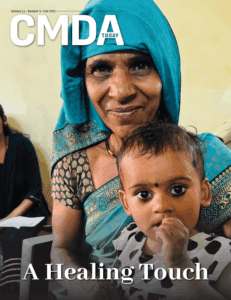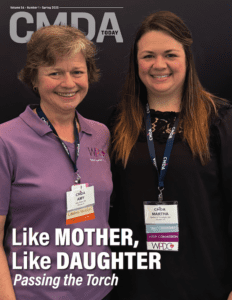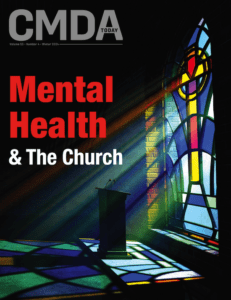Resilience in the Face of Personal and Organizational Adversity
Try as we may, adversity is unavoidable. Often unexpected, hardship comes into our lives in a variety of forms and levels—a cancer diagnosis, a harsh public criticism, a mistake or accident with a detrimental outcome, an economic downturn or even a pandemic or natural disaster.
by Gregory L. Neal, DHA, MSHA, MBA
Try as we may, adversity is unavoidable. Often unexpected, hardship comes into our lives in a variety of forms and levels—a cancer diagnosis, a harsh public criticism, a mistake or accident with a detrimental outcome, an economic downturn or even a pandemic or natural disaster.
Often it seems when we think we’re living the dream life—a great marriage, beautiful children and a comfortable home—our world gets rocked in the most unexpected way. Our world was shaken when a cancer diagnosis hit our family, without warning. We grew tremendously during the difficult journey through the treatment process. (Thankfully, we are now cancer free.) Cancer was not the last adversity we experienced. 2020 brought unique challenges to us all, and for me, “unprecedented” took on even greater meaning from an experience with new opportunities to learn and grow personally, professionally and spiritually.
What is the Antidote to Adversity?
Our response to adversity is proportional to how prepared we are to act when faced with difficult challenges, our ability to walk with grace through the fires that test us and the resilience we need to bounce back.
Is resilience something you naturally possess or something you must acquire? The good news is it’s probably a little (or a lot) of both. Hope awaits us all!
Rooted in our worldview as followers of Christ, our faith must be a wellspring of resilience. I’m confident the hardships I experience are not random acts without meaning in this wide cosmic universe. It isn’t karma. I believe God is good all the time and even misfortune is ultimately for my good in some way. While it may be painful and not an ordeal I would choose to experience, I can see my circumstances as tools in God’s hands, in hindsight. I am not a mere victim, nor do I deserve a life completely free of hardship. Humility is a blessing, and we can all benefit from more of it.
From Scripture, we know it’s not a matter of if, but when, we will encounter various trials; however, we can take comfort from Romans 8:28, which reminds us, “And we know that for those who love God all things work together for good, for those who are called according to his purpose” (ESV). It’s important to note here the definition of “good” isn’t about what is pleasant or comfortable, and it certainly may not reveal itself as quickly as we’d like. When we faced a diagnosis of cancer, painful as it was, we could be confident it would work out for the greater good as it deepened relationships and redefined life’s priorities. In large measure, thanks to a loving and skilled oncology team who gave us hope it was treatable, yet in greater measure to a loving God who assures us He will never leave us or forsake us. And, while the journey was an agonizing, often tear-filled marathon, we experienced much good from the invaluable lessons we learned as we worked through the situation and encountered the kindness of others.
Abundant examples abound of hope in history and countless stories of redemption. We all love a good comeback story. Abraham Lincoln experienced multiple setbacks in his personal and political career before being elected president in 1860. Despite his earlier failures, he is unquestionably one of our country’s greatest presidents.
Reggie Jackson, heralded as “Mr. October” for his reputation as a post-season clutch homerun hitter, also holds the record for most career strikeouts by a batter (2,597). Yet, he also had 2,584 hits in his 21-season career.
Walt Disney, the most well-known cartoonist in the world and creator of iconic characters, rose to this stature after dropping out of high school and overcoming multiple business failures. Of the challenges he faced, he said, “All the adversity I’ve had in my life, all my troubles and obstacles, have strengthened me… You may not realize it when it happens, but a kick in the teeth may be the best thing in the world for you.”
How Do You Build a Network to Strengthen Your Resiliency?
Resiliency can be built with the support of mentors, colleagues and a network of relationships with people who will speak the truth to you, encourage you and guide you in your efforts to move forward.
Your success is reflected by the people with whom you surround yourself.
- Know your value, align yourself with and focus on people who will encourage you and hold you accountable to your true identity and purpose.
- Invest your time in a few trusted people with whom you can be vulnerable and nurture transparent conversations.
In her 2018 book Dare to Lead: Brave Work. Tough Conversations. Whole Hearts, Brené Brown recommends an exercise to identify those people whose opinions truly matter to you. Of all the people in your sphere, whose influence in your life matters most? Settle in your own mind the people or types of people about whose opinions you really care. Those are the relationships in which to invest.
If you’ve ever been in a weight-training room and bench-pressed, you know that to really push yourself you need a spotter, someone who will be there when things get too heavy to make sure the weight doesn’t crush you.
I’ve learned the importance of having trusted spotters in my life to help me professionally, spiritually and emotionally. They are those few, those vital few, in whom you can rest assured will always be there to speak the truth to you in love, to pick you up when you fall, to cry with you when it hurts, to cheer you on when you’re blessed with success. For these spotters, your relationship is not transactional; it is unconditional. We all need them for our own well-being as well as the organizations we lead, especially when the need is to accelerate through adversity.
Adversity on the Organization Level
When organizations face hardship, resiliency comes from nurturing the health of the team before the trouble develops. The healthier the organization, the better it is equipped to maintain unity and emerge from the difficulty stronger than ever.
What does a healthy organization look like? The health of an organization is not merely about financial success. An organization with the strongest balance sheet can still be unhealthy at its core, robbing it of the ability to achieve its full potential.
Chick-fil-A founder S. Truett Cathy built a wildly successful, people-centered corporate culture by:
- Assuming the best in others. Trust your colleagues and believe they come to work with the best intentions of helping the team be successful (rather than harboring selfish motives).
- Wanting the best for others. Genuinely desire that others fulfill their dreams, and then find joy in helping them along the way.
- Expecting the best from others. In authentic, collegial relationships it is safe—and expected—we will call out one another when we aren’t showing up with our best. We balance it knowing we aren’t perfect and never will be, so we must have the grace to accept that mistakes will be made and disappointment will occur, even with those we’re closest to and when we have the best intentions.
Remember the earlier weight room analogy? Here’s another fact about weight training. You get stronger when you work your muscles, which requires knowledge, stress and recovery. Using these steps will build muscle as well as resiliency:
- Knowing your blind spots and keeping your spotters close by your side will help magnify your strengths and mitigate your vulnerabilities.
- Managing stress with healthy habits like exercise, prayer, journaling or any activity giving perspective on the journey will keep you grounded. Lean into what you do best, and when difficulty comes, don’t quit. Press on, knowing it will only make you stronger when you work through the pain with wise coaching.
- Recovering from a hard workout or life event is aided by demonstrating healthy habits for stress management, giving yourself time to recover and connecting with people who encourage you and contribute to keeping your bucket of hope full.
Healthy organizations can better manage adversity, emerge from challenges as a stronger organization and be better prepared to face future trials. Initiating positive change and continual improvement enhances the health of the organization. Like the people within it, an organization is never perfect and will never be perfect, although, we can be obsessed with getting as close to perfect as possible by being true to our core values, continually innovating while developing and implementing new ideas to create value for the organization, our team members and those we serve.
We often hear the phrase repeated, “No one likes change,” yet realistically, who wouldn’t welcome positive change? Building and accelerating positive change requires a different cultural perspective. Rather than feeling shoved from behind in an environment where, “We are forced to make this change,” nurture a positive culture drawing everyone into the inspirational opportunity with the perspective, “We get to make this change!” Manage it well and you’ll have an army of volunteers willing to step up and meet any challenge.
Even in the most traumatic circumstances, individually or organizationally, if we are grounded in the truth, great opportunity for positive growth can emerge from the pain. Uninvited trials may be just the blunt instrument needed to push us into making positive changes we otherwise may never have discovered. Embrace the idea of the exact thing you would never have invited into your life or your organization, leading you to fulfill a higher purpose, enjoy more rewarding work and experience deeper and more genuine relationships.
In the end, remember you are unlikely to manage well adversity of any magnitude alone. Would you be in a healthy place if you had to go it alone? Whether it is cancer or criticism or a crisis beyond your worst nightmare, it’s imperative you don’t try to face it single-handedly. No one should have to feel abandoned on their worst day. Recent years have brought unimaginable trauma to many who faced isolation and illness, joblessness and hopelessness. Surely, we can see the importance, now more than ever, to invest in building and sustaining resiliency in one another. It will improve the quality of our lives, our teams, our communities and our world.
Sidebar
The Christian Healthcare Executive Collaborative
As a new ministry of CMDA, Christian Healthcare Executive Collaborative (CHEC) is a community of Christian healthcare executives who inspire and support one another by seeking to encourage connection, promote excellence and integrate faith and work.
CHEC exists to:
- Develop an active community among Christian healthcare executive and administrative leaders
- Promote Christian truth in the healthcare industry using biblical principles
- Recruit, place and grow individuals in leadership positions both domestically and internationally
CHEC serves to:
- Support and encourage involvement with healthcare missions both domestically and internationally
- Volunteer to serve as consultants to both international and domestic healthcare mission organizations
- Provide expertise and develop educational resources for training healthcare executives and leaders
- Mentor and coach future Christian healthcare executives and administrative leaders
We have a number of ways for Christian healthcare leaders to get involved and benefit from this new community, so if you’re a leader in your health organization, we encourage you to “chec” it out! For more information about CHEC, visit www.cmda.org/chec. To contact Dr. Neal, email [email protected].
About the Author
Gregory L. Neal, DHA, MSHA, MBA, is a 30-year veteran of healthcare executive leadership, and he currently serves as Co-founder and Director of CMDA’s Christian Healthcare Executive Collaborative (CHEC), a community of Christian healthcare executives to connect and engage administrative healthcare leaders with opportunities to serve one another and the kingdom of God through a not-for-profit consulting service for missional healthcare professional organizations worldwide. In addition, Greg currently serves as Interim CEO of Kanad Hospital, a Christian mission hospital located in the Abu Dhabi Emirate of the United Arab Emirates. He earned a doctorate in healthcare administration from the Medical University of South Carolina and MSHA and MBA degrees from the University of Alabama at Birmingham. He has extensive executive-level experience within an integrated health system in the U.S., and his professional passions include leadership development, nurturing culture, physician collaboration, population health and accelerating positive change that creates value. He and his wife Beth have two adult daughters.




